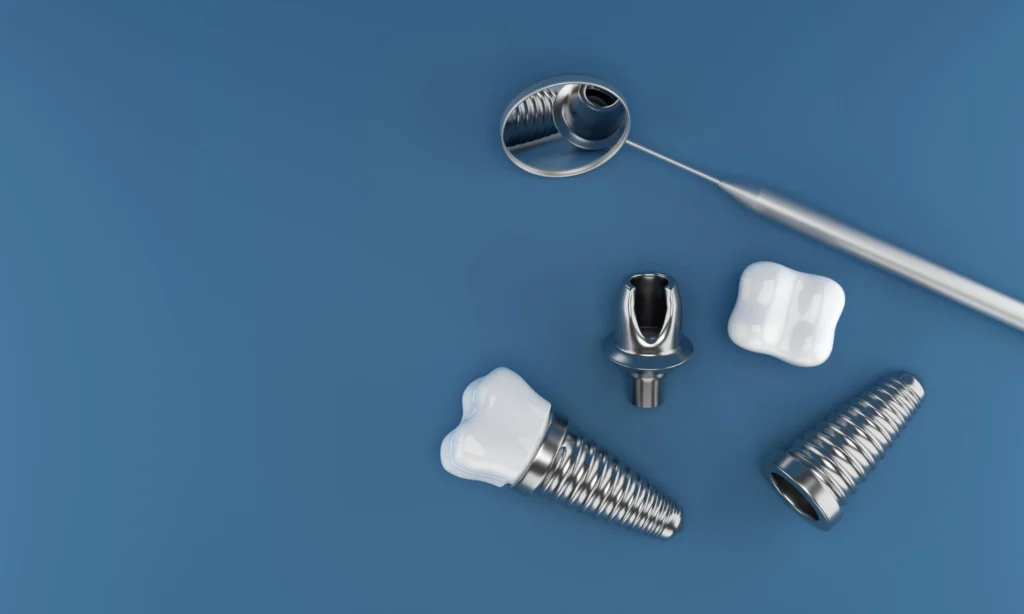Welcome to our blog post on Dental Implants – a solution for those seeking lasting tooth replacements. In this post, we’ll dive into the nuances of dental implants, covering considerations, benefits, and the key aspects of making informed choices for your oral health. From surgery to finances, join us on a journey to understand why dental implants stand out as a transformative option.
What are dental implants? Introduction to implant dentistry
To restore a missing or damaged tooth, dental surgeons often turn to dental implants. Picture them as tiny titanium screws securely embedded in your jaw, providing a sturdy foundation. These implants not only offer a solution for single tooth replacements but can also support multiple teeth, mimicking the natural appearance of your original set.
Dental implants function just like your regular teeth. You can chew and eat your favorite meals with the confidence that your teeth can handle it, just like your regular ones. What’s more, others won’t even notice that some of your teeth are dental implants.
However, losing a tooth has broader implications than just affecting your visible smile. When a tooth is lost, the jawbone might start to thin and shrink, altering your facial appearance and even contributing to an aging effect.
There are situations where dental implants might not be the optimal solution. At Dental Surgeons Ltd, our preference is always to preserve and care for your natural teeth. It’s crucial to explore various options and engage in open discussions with your dentist before committing to procedures like dental implants. If you are located in Wheaton, Illinois please give us a call and we will help you with your dental needs!

Why Choose Dental Implants Over Dentures? dental implant Benefits
Dental implants bring a host of advantages, offering a more seamless solution compared to alternatives like dentures. While dentures may present a more budget-friendly option for a full set of teeth replacement, they fall short when it comes to replicating the functionality of natural teeth.
Chewing efficiency takes a noticeable hit with dentures, impacting your ability to enjoy food to the fullest. The importance of teeth extends beyond aesthetics; it plays a crucial role in speech, tasting foods, and chewing various textures. Dentures, though functional, often necessitate a softer diet, making it evident that they don’t quite measure up to the desirability of a healthy, natural set of teeth.
Dental implants, on the other hand, offer a big advantage. They allow you to engage with life as if you have a set of natural teeth. Worries about slippage or movement while eating or speaking become a thing of the past with dental implants. However, it’s essential to emphasize that while dental implants provide this level of comfort and security, maintaining oral hygiene remains imperative for their longevity.
The durability factor also leans heavily in favor of dental implants. They are made to last a lifetime, the hope is that you’ll only need to undergo implantation once. The crown attached to the implant has a lifespan of 10 to 15 years, with regular wear and tear being the primary reason for replacement. With proper care, implants can surpass these estimates, making them a long-lasting solution. In comparison, traditional dentures typically require replacement every five years.
Dental implants are made to blend in with your natural teeth, with the crown being the only visible part. Typically made from porcelain or tooth-colored material, it’s custom-matched to your remaining teeth, ensuring an undetectable difference. When done well, no one should be able to tell the difference. When people wear regular dentures people can often notice that.
Beyond aesthetics, dental implants offer a range of benefits affecting your diet, bones, gum health, and overall quality of life. Missing a single tooth may not initially seem impactful, but the potential shift in teeth and alterations in eating habits become more noticeable with multiple missing teeth. Dental implants restore the ability to enjoy a healthy, varied diet.
Crucially, dental implants play a vital role in maintaining bone structure. Traditional dentures can contribute to bone collapse, altering your appearance over time. Additionally, the absence of a tooth can lead to gum recession, creating pockets prone to bacterial buildup. Dental implants, requiring regular care like flossing and brushing, mitigate these risks.
Moreover, the emotional impact of tooth loss is not to be overlooked. Dental implants provide a reliable solution, ensuring you can eat, talk, and present yourself confidently without concerns about slipping or clicking, which is a common issue with dentures. Investing in dental implants may not just restore your smile but also boost your self-assurance, alleviating anxiety associated with missing teeth.
Get Dental Implants in Wheaton at Dental Surgeons Ltd and restore your confidence and reduce anxiety from having a missing tooth.
What are the different types of dental implants?
There are many different brands of dental implants. This is something that you can discuss with your dentist. However, your dentist will usually use the best materials possible in order to achieve the best results possible. Call us to get your dental implants!
Just like a screw can need a flat head or a phillips head screwdriver, Dental Implants can also have compatibility issues. The most common connection in the world is an Internal hex type implant. While it may sound good to get a good deal on an implant, you should think about what you may need in the future. It is better to use common connections to avoid future issues with parts.

Who are dental implants for? Are they right for you?
Dental Implants are for anyone who is missing one or more teeth. They can be for anyone who is missing them or who has teeth that have gone bad.
Dental Implants are placed into bone. So if your jawbone has shrunk over time you may need additional procedures to get your jawbone ready. Thinning gums can also be an issue and it always makes sense to consider taking a CT scan to see everything. This is part of consultation and diagnosis before treatment begins.
Sometimes your teeth that are remaining need treatment before Dental Implants. Sometimes we may even ask you to see your Medical Doctor before we consider doing implants. It is important to be in optimal health for any kind of surgery.
Common Concerns about Dental Implants
In individuals with good health, dental implants have a success rate ranging from 90-95%. While this indicates a high likelihood of success, it’s essential to acknowledge the rare instances when dental implants may not be as successful. This awareness is crucial before embarking on any treatment.
Just like your natural teeth, dental implants require regular check-ups and maintenance. Remember, all things need care to thrive.
For those seeking a metal-free option, it’s worth noting that almost every material used for tooth replacement contains some form of metal. Dental implants, however, are crafted from a Titanium alloy, a proven and safe metal widely used in the body. Titanium is utilized in joint replacements, with extremely rare cases of allergies reported.

Dental Implant procedure: What to expect?
The process of placing dental implants is a surgical procedure, and like any surgery, it comes with its own set of risks, benefits, and recovery time. In some cases, a patient may require a bone graft or a sinus lift before proceeding with the implant. The journey to receiving your tooth or teeth can take up to a year, factoring in necessary recovery periods.
While the idea of surgery may seem daunting, the recovery time is a crucial aspect to consider, especially if additional procedures like bone grafts or sinus lifts are needed. Depending on the extent of these treatments, the entire implant process could span over a year.
Despite the time and effort involved, the positive impacts on your health and self-esteem make dental implants worthwhile. However, the high cost may pose a challenge for many patients. Commitment to meticulous care is essential to avoid complications that could lead to the removal of implants.
If dental implants are financially out of reach, it’s important to remember that replacing missing teeth is crucial. Quality dentures or a bridge can be viable alternatives, offering better solutions than leaving the gaps unfilled.
How expensive are dental implants? Cost Considerations and Insurance Coverage
Choosing dental implants comes with a higher price tag compared to other options for replacing one or multiple teeth. In the United States, the cost to replace a single missing tooth typically ranges from $3,000 to $6,000. While the expense is a consideration, it’s important to weigh it against the long-term benefits and positive impacts on your health and lifestyle.
If someone needs a full set of teeth (24 teeth or 28 teeth), there are options that can range from $15,000 to $30,000. These are ALL on 4 or ALL on X procedures, these use 4 Dental Implants or more in each jawbone.
Costs are important to consider in treatment, but they can be an important investment in your health. Being able to chew with a proper set of teeth allows you to enjoy eating and help to maintain a good quality of life.
Insurance may cover a portion of the treatment, however there will be a large percentage that is not covered by insurance. There are many options, even financing for procedures like these. Please remember to speak with Dental office staff if there are questions about that. If you are in need of Dental Implants, call us or visit our office!
Conclusion
As we wrap up our blog on dental implants, it’s clear that this option offers more than just a replacement for missing teeth. Despite the higher cost, the investment in your well-being is significant. We’ve also touched on alternatives, recognizing that every smile has unique needs. Whether it’s a single tooth or a full set, the decision is yours to make, tailored to your preferences, needs, and budget. Remember, a confident smile is worth the consideration!




